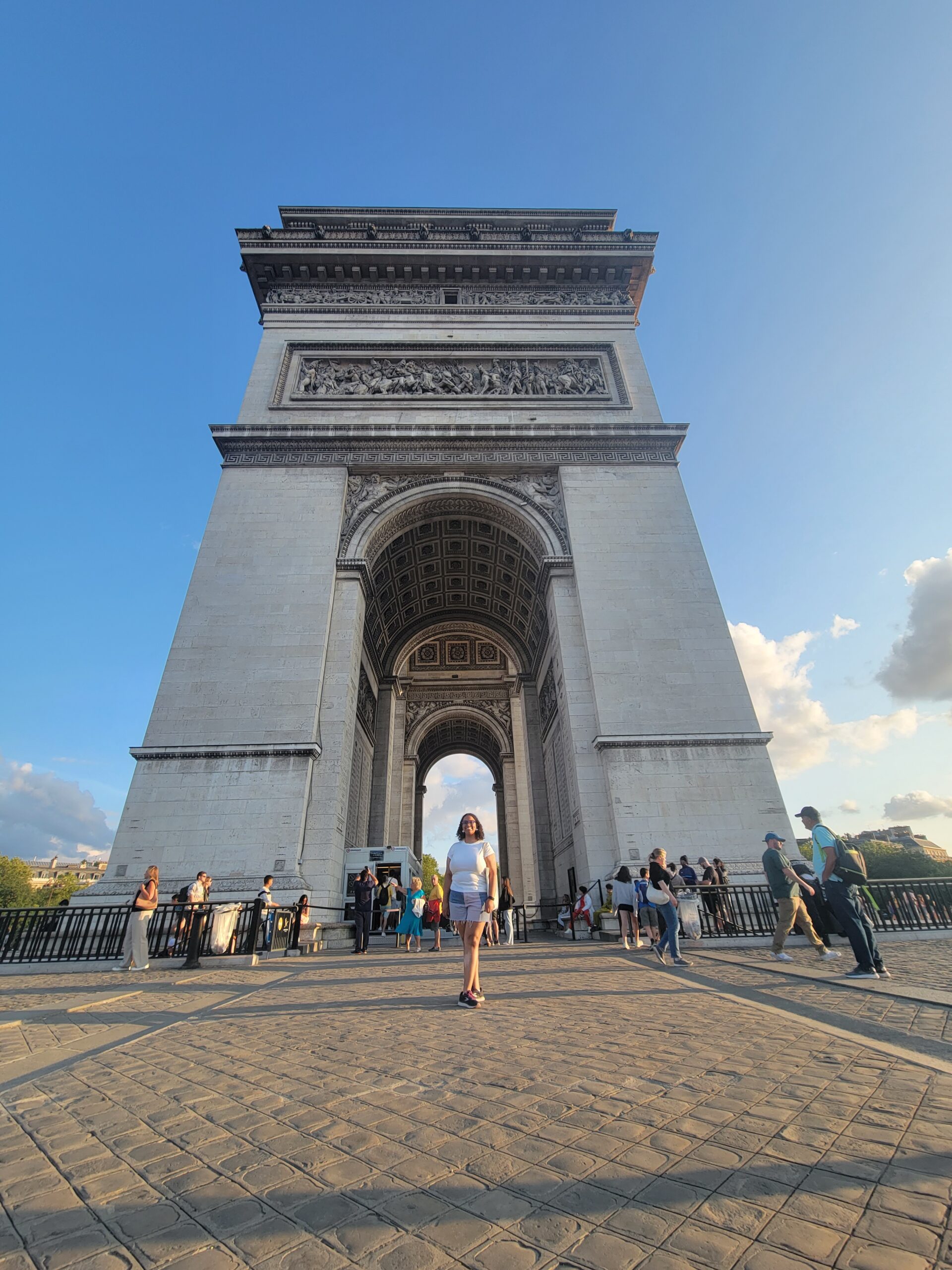
Letters to Myself – African American Expats in Copenhagen and Paris
One of my assignments for my third and final class abroad (African American Expats in Copenhagen and Paris) wanted us to “use the examples from African American expatriates to write a letter, poems, a short story, or an essay that captures your experience in Paris.” So I decided to write three letters which I will share with you here:
07/16/2023
Dear me,
I suppose I’m writing to myself, I did consider having my mother or boyfriend as my audience, because they often are my audience in my journals, but I won’t need to alter my thoughts to myself. My family sometimes can be stubborn, and aren’t always open to critcisms I have of institutions of which we have collectively subscribed. My friends and friends of my family, as loving as they are, are mostly white, and there have been times in the past where lack of comprehension is equally frustrating. Don’t get me wrong, I don’t mind helping to educate and inform them, especially since they do genuinely want to understand, or understand as much as they can, but it is exhausting sometimes. But I try to be patient, even though it’s the divine virtue I’m the worst at managing. Crystal, my little sister would be another option as an audience, but she only wants to talk about unicorns and manga. Unfortunately, the world is not just unicorns and manga, but I sometimes do envy her blissfulness.
Technically I’m not in Paris yet. We leave tomorrow, but I wanted to start this assignment early and preface some of my thoughts.
I did my readings already, and I read through the not-so comprehensive list of known African-American icons Post WWII. Perusing the list reminded me of a thought (or feeling) that I’ve had while in class discussing Ethelene Whitmire’s research : I feel…Guilty? For not knowing about all these changemakers whose presence made it a little easier for me to be where I am now, in Denmark, studying abroad and representing a PWI. It’s not all my fault; the textbooks provided by the American public education system leaves much to be desired to say the least. But I feel I could have done more in self-educating, but participating in this class will hopefully quell some of that guilt. And connect me to my Blackness.
I remember at the beginning of this class, one thing that I wanted to get out of this class is being able to connect with my Blackness more. I grew up with white people, most of the people I interact with are white, I “talk” white, I go to a PWI, etc. That isn’t to say I’m not thankful for the village that helped raise me (it’s hard being a single mom with two daughters) and my dear friends and the education I’ve been blessed with. But being Black is an undeniable part of my existence that most people in my life can’t fully understand. I feel pride in the accomplishments and the stories that Black people have to share, so I’ve been enthralled by Lesley-Ann and our guest speakers (Carleen Shankle and David Morrow) and our Black changemakers of the past. I think that pride is involved in my not-fully-fleshed-out and variable definition of Blackness. I keep thinking, “I want to make history like all these icons”, but I am making history in my own way. I don’t need to be written into a textbook (although that would be cool) for my history to be written– I’m doing it right now. I do mourn for all the Black people who have been omitted, as the victors of history will include what makes them look good, but the spirits of my ancestors and changemakers are entwined with mine.
Going back to the reading that we are to “do at our leisure”, I did some listening of June Richmond, an American singer who was based in France and traveled to Scandinavia. Some of her songs include :
La danse du baiser
Je cherche un homme
Ah ca fait boum
L’étrangère au paradis
I did pick the French ones to warm up my broken French in preparation for this week (which is negated now because I’m just listening to the Jungle Book soundtrack now). But her voice is amazing and clear, even I can pick out words. June was featured by a white-man-band which was obviously rare in the late 30s/early 40s. According to IMDb, she also acted in some movies and TV shows like Murder in Swingtime (1937) and Reet, Petite, and Gone (1947). If I can’t find these later, like at a library or something, I’m labeling this as a hate crime (update: just found Reet, Petite, and Gone on YouTube). I do find it interesting that she started off opera but switched to jazz at 15, but I guess from hearing her jazz records, I’m not surprised she was so versatile. It is a shame she died so young, but that does make me worry a little about my mortality.
I think doing exploration of one or a few Black icons per day on my own time will be the most effective instead of just skimming history. There is truthfully so much to cover just in four weeks and in 5 days in Paris, so this system will be good I think.
My laptop is dying and I need to pack so I’ll wrap up my letter now. I’m ready to experience the city of light tomorrow
Elizabeth S Whitmore
07/17/2023
Dear me,
I’m going to sleep real good tonight, but first, I want to write the letter to not get behind on this assignment. As today was travel day and acclimate-to-Paris-day, we didn’t do a lot of class exploration of African Americans in Paris; that starts tomorrow. But people are more colorful here; there is definitely a difference in diversity in comparison to Copenhagen. However, some black and other people of color are scraping by for extra cash by selling cheap souvenirs and water, which is not the most desirable place to be in. Of course, someone will always be around to sell such souvenirs, but it makes you wonder why and how the French government is “helping” Black folks.
It was interesting driving into Paris from the airport; on the outskirts of the city there were lots of Black people walking around, but some seemed visibly homeless. I heard someone say that this wasn’t “the Paris that everyone imagines”, and I agree– it’s a bit demystifying . It’s a juxtaposition from the romantic version of Paris where everyone is happy and in love and eating delectable French pastries. There is still poverty here, but it wouldn’t be fair to say the majority of French citizens in poverty are Black and depending on the government– that’s what is just visible (this phenomenon occurs in America too). So what I see is a modern counter narrative to the experience of Blacks in past experiences “no racism” here.
One thing I honestly didn’t know about Paris and Copenhagen is how popular jazz is here? I guess if I had consciously thought about it before, I could have made that connection. But in my mind, jazz was an American thing, and in a way, it still is. African Americans brought jazz over to Europe from America, and it became an international sensation. I grew up with jazz through my mom (even though I didn’t fully appreciate it as a youngster), specifically learning about its history through a book called Jazz by Walter Dean Myers. It was paired with an audio CD read-along with music, and my mom rented it from the library for us every summer. I think I want to listen to it when I get back home. This all to say that jazz is so versatile and tasteful, but I think it’s important for Europeans who exoticize jazz to dive deeper into its history.
I’m sleepy now. I’ll fall asleep to some jazz.
Elizabeth S Whitmore
07/19/2023
Dear myself,
Storytelling is so important. I’m not just saying this because of the seven books I bought today, but passing on our knowledge is so important. My mother raised me with stories of her life, her family in Jamaica but also stories of Crystal and I when we were younger. She brought us to the library constantly as children which fostered a love for reading, books, and the healing powers of storytelling. Now, I’m not 100% knowledgable about all the powers of storytelling, but when Lesley-Ann was telling me about a healing circle that primarily involved telling stories, something about that resonated with me. The passing of experiences through the heart and soul of someone, especially Black folks, reminds me of my roots and my future. The stories and poems from Lesley-Ann, Jamika, Camille, Jeannine and her companions (shoutout to Sabrine who greeted me), and my ancestors (whose stories I don’t completely know but I can feel them) are tangible and enthralling. I feel like I’m a kid during storytime. But now that we have met, their stories are now a part of my history.
Peace, and Love, and Respect for all Mankind.
The reactions to our stories (which can be regarded as counter storytelling as white folks have controlled what stories get repeated) is interesting. Lesley-Ann has been an advocate for this for the entirety of our time together. When she and a tour guide were sharing (read: contesting) knowledge, the tour guide seemed to take offense to new information, even though it wasn’t at all directed at their character. During our walking tour (everyone praise my feet and legs for taking me all around Europe, they are a little tired), another tour guide seemed to have a more receptive reaction to new information that Lesley-Ann was sharing. However, they seemed to be caught off guard when Lesley added some dark history about a person or said she did not like the chain-link statue by Fabrice Hybert (I actually didn’t mind the statue itself, but I did think it was insensitive that someone with such privilege made a statue for an anti-racism cause). Not everyone has to like every piece of art or the history of its creation anyway. The reactions from these white individuals, despite intentions, were defensive, which is natural. Whenever we hear counters to information that we base our conclusions off of, defensiveness is a knee-jerk reaction. But why do we have such visceral reactions? Specifically, in this context, why do white people with good intentions have visceral reactions?
I wouldn’t know because I’m not white. But if I had to hypothesize, it’s what I alluded to. They think it’s an attack on their character, and white people living now technically didn’t enslave anyone. They don’t have plantations. Well, at least most of them. However, white people, even if they are conscious of the fact, are where they are now because of the atrocious actions of their ancestors. Coming to terms with that is difficult. And what do you do when you finally “come to terms with it all”? I think that depends on the victim’s (Black and indigenous people of color) opinion. But as I cannot speak on behalf of my melanin-blessed siblings, that’s something we’ll have to discover together.
Elizabeth S Whitmore

